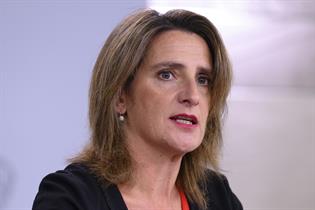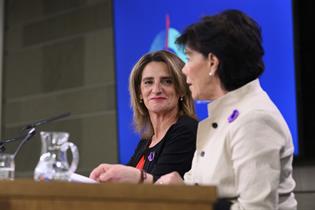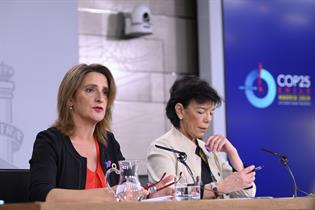The Council of Ministers has approved the I Strategic Plan for Professional Training of the Education System 2019-2022, which aims to modernize the consolidation of this formative stage.
The Minister of Education and Professional Training and spokesperson for the acting Government, Isabel Celaá, has argued that this training improves employability, covers the needs of the labor market, changes the production model and has a great impact on the economy.
Celaá explained that Spain has more university graduates than the European Union, 35% of people with low qualification and only 24% with medium qualification, which will be the most demanded in the coming years.
The minister has advanced that Europe estimates that by 2025 exclusively 14% of low-skilled jobs and 49% on average will be needed, so the level of knowledge of citizens must be increased.
In addition, Spain is the country with the lowest proportion of students (12%) enrolled in Vocational Training (FP). The European average is at 29% and the average of the Organization for Economic Cooperation and Development (OECD) at 25%. Therefore, promoting Vocational Training is a priority for the Government.
Keys of the Strategic Plan
Pool Moncloa / Borja Puig de la BellacasaThe plan agreed today was presented to social agents (CEOE, CEPYME, CCOO, UGT) in September 2018 and intends that all economic and productive sectors be involved in it.
Isabel Celaá stressed that "there is no FP without a company", so the Executive is working with 300 companies to redesign the Observatory of Qualifications. In this sense, the Government's project is to design 80 new titles and specialization courses closely connected to digitalization in a legislature and update the contents of the 172 existing titles in collaboration with companies and autonomous communities.
One of the axes of the plan is to make the organization of the titles more flexible so that they can be taught online. In addition, they will be modular in order to guarantee access to education regardless of the territory where the student resides. Another objective is to create 200,000 new Vocational Training places in four years and extend the Mentor Classrooms to reach 3,000 medium and small-sized municipalities.
The minister has pointed out that almost half of the active workers have professional experience but do not have a degree that proves it, so the plan includes a procedure to accredit basic skills for 20,000 adults a year.
Likewise, Celaá has stressed that teacher training has to be permanent, so joint innovation projects with companies and teacher exchange between educational centers are being carried out.
On the other hand, in relation to Vocational Training, the Executive has approved to allocate 61 million euros to different educational programs of territorial cooperation with the autonomous communities, the majority directed to the teachings of FP.
It also has created as a national reference center, the Centro Labora Formació de Castellón, in the professional area of Ceramic Manufacturing.
Just energy transition


The Minister for the Ecological Transition in operation, Teresa Ribera, has affirmed that this new regulation aims to restore the confidence of investors in renewable energies that were affected by the reform of the sector in 2013. At that time, he explained, the change in the premises of profitability and remuneration on which the investors had made their initial calculations "greatly reduced the forecasts of recovery of the previous investment and caused a huge conflict".
The number of plants that were affected by that modification is 64,000, according to the data provided by the minister, which has also referred to the numerous litigation and arbitration proceedings that the investors then affected – mostly international – initiated and that they have given, or may give rise to, the recognition of compensation and compensation by the State.
The Royal Decree-Law allows these investors with facilities prior to 2013 to maintain, until 2031, the current profitability for their facilities at 7.39%, provided they renounce to receive the compensations approved in their favor or desist from arbitration processes or judicial in progress.
On the other hand, the new regulatory text generally updates the value of reasonable profitability that will be applied to renewable energy, cogeneration and waste facilities in the period 2020-2025, which will be 7.09% compared to 7.39 Current% of average.
Alleviate the impact of thermal power plant closure
The text also establishes measures to mitigate the impact of the closure, in 2020, of eight of the fourteen power plants from coal that exist in Spain. "The objective is that in the affected areas there is no blackout but a transformation of industrial and economic activity," said the minister.
In this way, Ribera continued, future renewable energy projects that allocate their investment "to generate quality employment in the affected areas" will have priority when obtaining concessions for the evacuation of electricity to the general grid and use of waters that will be released when the thermal power plants cease their activity.
101 million for the hiring of researchers and doctors


Isabel Celaá has stressed the importance of these programs, framed in the State Program for the promotion of talent and employability, because they allow the development "of science, research and experimentation".
The program 'Ramón y Cajal' has an economic endowment of 61.7 million euros for the hiring of 200 Spanish and foreign researchers of outstanding trajectory, while the grants "Juan de la Cierva" will allocate 32 million euros to hire 450 Young doctors
Another 200 doctors may join companies and technology centers for three years thanks to the "Torres Quevedo" contracts, which have a budget of 15 million euros. Another 4 million will be allocated to 60 contracts for training researchers in companies.
Finally, the minister explained, there will be aids so that university graduates and higher vocational training technicians can work as technical research support staff.
Elimination of violence against women
Isabel Celaá has reported that the Executive has approved a institutional statement in which it makes clear that violence against women is any act of violence based on belonging to the female sex.
On the occasion of the International Day for the Elimination of Violence against Women, on November 25, the Government ratifies its determined commitment to continue dedicating all its efforts to combat violence against women in all its manifestations, its solidarity with the victims and its most resolute condemnation of attitudes and acts of violence towards women due to sex or gender, guaranteeing the human rights and fundamental freedoms of all women.
Children's rights
The minister recalled that this week has celebrated the Universal Day of the Rights of the Child and the 30th anniversary of the Convention on the Rights of the Child. For this reason, the Executive has approved a institutional statement in which he reaffirms his commitment so that all children can prosper, learn, make their voices heard and reach their full potential.
Other agreements
- Approved the necessary financing -1,945,195 euros-, for increase 2.25% of salary to health professionals of the public sector in the year 2020.
- 15 million euros allocated to the Autonomous Community of the Canary Islands for mitigate the effects of the insolvency of the Thomas Cook business group in the tourism sector of the archipelago.
- Awarded to Santos Juliá Díaz, posthumously, the Medal of Merit in Research and University Education, in its Gold category.
Current affairs


On the other hand, Isabel Celaá recalled that the European Commission recognizes that the behavior of the Spanish economy during the first quarter of the year has been more positive than it predicted. This has been possible, he said, thanks to the "rigorous management" that both the Ministry of Economy and Business and the Ministry of Finance are doing. "We are able to grow in social policies and, at the same time, reduce the deficit," he said.
